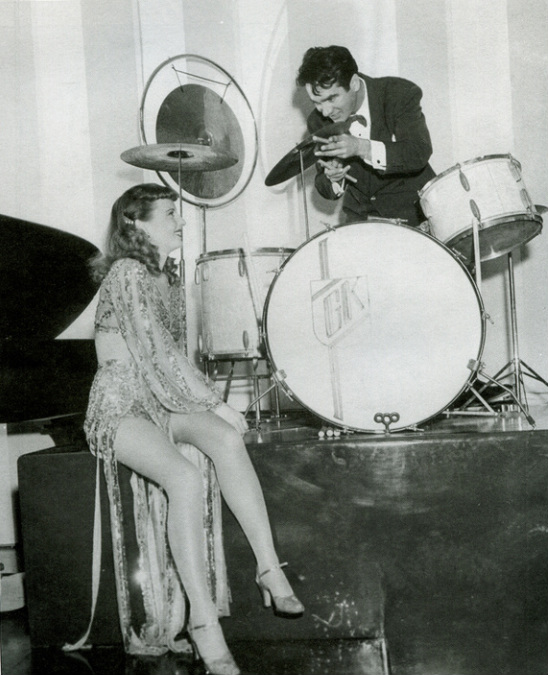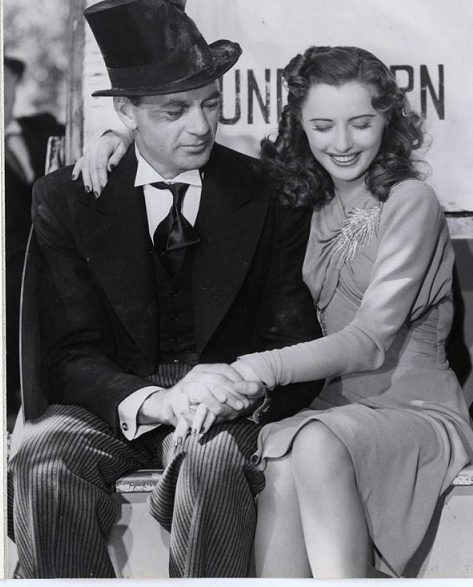
Aiyeeeeee! Not another Stanwyck snub?I just can?t take it!
Oscar snubs has got to be one of the juiciest of blogathon topics?we?re all so?passionate?about it. Myself included?At the moment, working on this post, I am mad enough to spit that Barbara Stanwyck, who might be my very favorite actress of all time (if I actually had to have only one favorite, that is?single favorites do not come easily to me), never got to go home with?Oscar.
?You?re kidding! How is that even possible??I think over and over when I look at a list of actors and directors who never got an Oscar. And when I see a list of people who did get them, sometimes it?s equally exasperating.
Wait a minute, I still can?t believe it. How the hell could Stanwyck, who for me edges out the other two actresses in my?Holy Trinity of divas (Davis and Crawford) for her appeal, her lack of pretension, her ability to be really funny or really poisonous or really glamorous or touching or steely or any combination thereof?how could she not have won anything but that honorary Oscar that is the Academy?s way of saying, ?We screwed up??
Of all the long, lamented list of Oscar snubs, none is harder to understand than Barbara Stanwyck. Her film career spanned 37 years and 84 movies. Not all of them were great, of course, but after she learned her craft in the early 1930s Stanwyck was never less than fantastic?and she created some of the indelible roles of classic film. She worked in all genres, and she was equally convincing in drama and comedy. Everybody loved working with her. She seems to have been the anti-Miriam-Hopkins, the consummate professional with not a smidge of temperament. Directors were nuts about her and at least one, Frank Capra, fell in love with her.
But every Oscar snub has its own story. Stanwyck was nominated four times, and four times she went home empty-handed. In 1982 they finally gave her that consolation Oscar, probably decades after she had stopped caring about the damned thing.
At the 10th Academy Awards, Stanwyck lost her first Oscar bid, for?Stella Dallas?(1937), King Vidor?s melodrama. That year the Academy saw fit to give Luise Rainer her second consecutive Best Actress Award, for?The Good Earth?(she had won the previous year for?The Great Ziegfeld). While Miss Rainer was a talented actress it is very hard from this distance to understand why she would have merited consecutive Oscars for these performances. That Rainer took home two in two years is even harder to take when looking at Oscarless Stanwyck WHAT THE HELL WERE THEY THINKING? ?Sorry, I have a kind of Oscar snub Tourette?s, and it breaks out once in a while?

In Stella Dallas (1937), Stanwyck?s first Oscar snub. Stanwyck should have won an Oscar just for wearing those horrendous costumes. Actually, this one doesn?t have a dozen roses tacked on; she?s just standing behind the flowers. Stella?s ghastly outfits are part of my (and writer Stanley Cavell?s) problem with the movie. But it?s a minority opinion?Stella Dallas is almost universally beloved. What made the Academy pass over it for a second year of Luise Rainer?
The second snub was four years later, for Howard Hawks?s delightful?Ball of Fire?(1941), an absolutely enchanting screwball comedy. This time she lost to Joan Fontaine in?Suspicion, which I think she won because they had failed to give it to her for?Rebecca. This is how the Academy Awards?get so screwed up. There are the awards that shouldn?t have been given, and awards that are given to make up for the ones that should have been given. The other nominees that year were Bette Davis for?The Little Foxes; Greer Garson for?Blossoms in the Dust; and Olivia de Havilland for?Hold Back the Dawn. Yes, Olivia lost to her own sister. That has to have done a lot to dispel sibling rivalry, don?t you think?

A publicity shot for Ball of Fire: Sugarpuss O?Shea with swing superstar Gene Krupa.
I?ve been wondering if part of Stanwyck?s Oscar trouble might have been that she lacked a studio to champion her. Unlike most stars of the era, Stanwyck declined to sign a long-term contract, preferring to work throughout her long career as a freelancer. The upside was that she could pick her own projects and command higher pay than if she were under contract, but the downside was that she lacked the support and cover a studio could provide. I assume that studio publicity departments had a lot to do with Oscar campaigns and that while it would be a feather in their cap for an actress in one of their movies to win the prize, their main efforts would be expended on their own stars, the ones under contract to them.

Snub #2: Ball of Fire (1941)
The ?41 loss doesn?t qualify?as a snub, strictly speaking. Nominations for performances in comedy are relatively scarce, and wins even scarcer. There are exceptions, like Cher for?Moonstruck, but it seems that like the general public, the Academy gives greater weight to dramatic than to comedic performances. The irony here is that great comic actors often turn in surprisingly powerful dramatic performances, while dramatic actors in their comedies often lack the lightness of touch necessary to great comedy.
Stanwyck?s next nomination, three years later for?Double Indemnity?(1944), didn?t have the comedy handicap. But the Academy this time went for Ingrid Bergman in?Gaslight. Bergman is excellent in?Gaslight, but Stanwyck is equally excellent as creepy noirista Phyllis Dietrichson, which is why awards (and for that matter Best Of lists) are so hopeless, imo. At that point it?s down to personal preferences and other considerations, such as who has won before or who hasn?t, and for what, and how badly you feel about that in the current round of voting.

Body language: Double Indemnity (1944)
The other nominees in 1944 were Claudette Colbert for?Since You Went Away; Greer Garson for?Mrs. Parkington; and the seemingly inevitable Bette Davis for?Mr. Skeffington, one of my very favorite of her performances but too eccentric for the Academy, I suppose. I love Colbert but not?Since You Went Away, and I?m generally allergic to Garson, so for me it would have been a three-way race. And honest to God, I don?t think I could have picked one. Probably just as well I don?t have voting rights for Academy Awards?I?d be?in this situation more often than not.

The last snub: Sorry, Wrong Number (1948)
Stanwyck?s last unfulfilled Oscar chance was in 1948, for?Sorry, Wrong Number. This time she got smoked by Jane Wyman in?Johnny Belinda. That?s a tough performance to argue against?Wyman had up to that time mostly been stuck playing dumb blondes in comedies at Warners, and she seems to have been as surprised as?everyone else that she had it in her. I would have had no problem voting for Wyman, and that?s a particularly compelling situation, when an actor you think you know turns out to have powerful talents you never imagined. The other nominees that year were Bergman (again), this time for?Joan of Arc, Olivia de Havilland for?The Snake Pit, and Irene Dunne for?I Remember Mama.?
And that was that. Stanwyck never got another nomination.
She certainly gave Oscar-caliber performances in other movies that never got her nominated:?Remember the Night?(1940),?Meet John Doe?(1941),?The Lady Eve?(1941),?The Strange Love of Martha Ivers(1946),?My Reputation?(1946),?The File on Thelma Jordan?(1950),?Clash by Night?(1952), and particularly?There?s Always Tomorrow?(1956)?a performance of great subtlety and depth but not fiery and so unlikely awards fodder. Then there?s?Trooper Hook?(1957), a lesser-known Western costarring Joel McCrea, where Stanwyck plays a woman returning after years as a captive of an Indian tribe, with a child sired by one of her captors. It?s worth a look next time TCM runs it. I also think she could have plausibly been nominated for her supporting role in?Executive Suite?(1954). It?s not a very large part, but it?s all operatic emotion, and the character?s actions are central to the plot.
In the end I just hope it didn?t bother Stanwyck all that much that she never won. She seems to have been in it for the work more than the glory. That is, Stanwyck was more actress than star, thought she was plenty of both. Her greatness in so many movies is bringing her new fans 16 years into the new century, decades after she left us. I like to think that somewhere, she?s smiling.

This post was written for the epic?31 Days of Oscar blogathon, Oscar snubs division, and this batch of entries is being hosted by Kellee at?Outspoken and Freckled. Run, do not walk, to see the other worthy entries?




Recent Comments